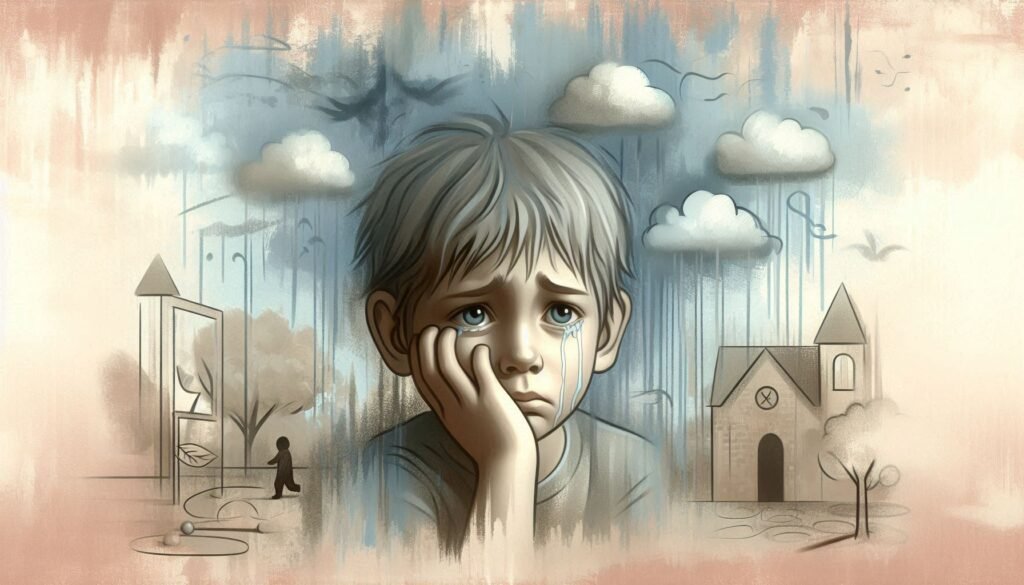Childhood is a pivotal time for emotional and psychological development. As children navigate their early years, some may display traits that point to neuroticism—a personality characteristic often defined by anxiety, moodiness, and emotional instability. Understanding these signs in childhood can provide valuable insights into later life challenges.
Recognizing neuroticism in childhood allows parents, educators, and caregivers to offer the right support early on. This proactive approach fosters resilience and encourages healthy emotional regulation. In this blog post, we will explore the foundations of childhood neuroticism, identifying key behavioral indicators and delving into how environmental factors contribute to its development.
Join us as we unpack the complexities of neuroticism in children: from recognizing early signs to understanding long-term impacts on personality. By gaining awareness of these aspects, you can better equip yourself with knowledge and strategies for nurturing emotionally healthy kids.

Foundations of Childhood Neuroticism: Genetic and Environmental Factors
Childhood neuroticism is influenced by both genetic and environmental factors. Research suggests that genetics play a significant role in predisposition to emotional instability. Children may inherit traits from their parents, making them more susceptible to anxiety and mood swings.
Environmental influences also shape neurotic tendencies. Stressful life events during early development, such as family disruptions or trauma, can heighten vulnerability to mental health challenges. The surrounding environment directly impacts how emotions are expressed and managed.
Moreover, parenting styles significantly contribute to the development of neurotic traits. Overprotective or excessively critical parenting can lead children to internalize fear and insecurity, fostering anxious behaviors over time.
Social context matters too; peers and community environments can either reinforce or mitigate neurotic tendencies. Understanding these foundations helps parents create supportive atmospheres that nurture emotional resilience while recognizing potential hereditary risks associated with childhood neuroticism.
Identifying Neurotic Traits in Young Children: Behavioral Indicators
Recognizing neurotic traits in young children can be challenging yet essential for early intervention. One of the primary indicators is excessive worry or anxiety about everyday situations. These children may fret over minor events, such as speaking to peers or participating in class activities.
Another behavioral indicator is moodiness or emotional instability. A child displaying rapid shifts between joy and frustration might struggle with regulating their emotions effectively. This inconsistency often manifests through temper tantrums or withdrawal from social interactions.
Additionally, perfectionism can signal neurotic tendencies in kids. When a child becomes overly critical of themselves and fears making mistakes, it may suggest an underlying anxiety that drives these behaviors.
Physical symptoms also play a role; frequent complaints like stomachaches or headaches without clear medical causes could point towards emotional distress linked to neuroticism. Observing these signs provides valuable insight into a child’s internal world and can guide parents toward appropriate support strategies.
Emotional Regulation Challenges: The Neurotic Child’s Experience
Children who exhibit neuroticism often face significant emotional regulation challenges. These kids may experience heightened feelings of anxiety, sadness, or irritability. Such emotions can feel overwhelming and difficult to manage, leading to frequent mood swings.
When faced with stressors—like changes in routine or conflicts with peers—they might react more intensely than their peers. This can manifest as tantrums, withdrawal, or excessive worry about minor issues that others would easily brush off. Their strong emotional responses can create a cycle where they become trapped in distressing situations.
In the classroom setting, these difficulties can hinder focus and participation. Neurotic children might struggle to engage openly due to fears of judgment or failure. They may also be more prone to perfectionist tendencies that add pressure on themselves.
Furthermore, their inability to regulate emotions effectively impacts social relationships. Friends may find it challenging to connect with someone whose reactions seem unpredictable or intense. This disconnect further exacerbates feelings of isolation for neurotic children.
Attachment Styles and Neuroticism: Exploring the Connection
Attachment styles play a crucial role in shaping a child’s emotional landscape. Research indicates that children who develop anxious or insecure attachment styles may exhibit higher levels of neuroticism later in life. This connection suggests that early experiences with caregivers significantly influence how children handle emotions and stress.
When a caregiver is inconsistent or overly critical, the child can internalize feelings of insecurity. As they grow, these feelings often manifest as heightened anxiety, worry, or moodiness—core traits associated with neuroticism. Conversely, secure attachments tend to foster resilience and emotional stability.
Children with an avoidant attachment style might display similar neurotic tendencies but typically respond differently. They may suppress their emotions leading to internalized distress rather than overt anxiety. This avoidance strategy can create complications in managing relationships and expressing vulnerability.
Understanding this link helps parents identify patterns early on. By fostering secure attachments through responsive caregiving, adults can potentially mitigate the risk of developing high levels of neuroticism in their children.
Parenting Influences on Neurotic Tendencies in Children
Parenting plays a crucial role in shaping neurotic tendencies in children. The approaches caregivers use can either foster resilience or exacerbate anxiety and worry. For instance, overly critical parenting may lead to heightened self-doubt and insecurity. Children raised in such environments often become more sensitive to stressors.
Conversely, nurturing and supportive interactions help build emotional stability. When parents validate their children’s feelings, they encourage healthy coping mechanisms. This creates a safe space for kids to express themselves without fear of judgment.
Moreover, modeling behavior significantly impacts how children perceive challenges. Parents who manage their own anxieties effectively teach coping strategies through example. Watching adults navigate difficulties can empower children to handle their own emotions better.
Inconsistent parenting styles—where affection alternates with criticism—can confuse young minds. Such unpredictability increases the likelihood of developing neurotic traits as children struggle to make sense of their experiences.
Neuroticism and Academic Performance: Impact on Early Education
Neuroticism in childhood can significantly influence academic performance. Children exhibiting high levels of neurotic traits often struggle with anxiety and self-doubt, which can hinder their learning experience. These feelings may lead to difficulty concentrating during lessons or completing assignments on time.
Additionally, neurotic children might have a heightened sensitivity to criticism. This can result in a fear of failure that keeps them from participating actively in class discussions or engaging with peers. Their reluctance to take risks academically limits exploration and creativity.
Furthermore, the stress associated with neuroticism may affect memory retention and cognitive processing speed. Children who are constantly worried about their performance might find it challenging to absorb new information effectively.
Teachers play a crucial role here by recognizing these challenges early on. By providing support and encouragement, educators can help mitigate some negative impacts of neuroticism on academic success while fostering resilience within these students.
Social Development: How Childhood Neuroticism Affects Peer Relationships
Childhood neuroticism can significantly shape how children interact with their peers. Children exhibiting neurotic traits often experience heightened anxiety and emotional instability, which can make social situations feel overwhelming. This fear may lead to avoidance behaviors, causing them to miss out on valuable opportunities for social interaction.
Additionally, these children may struggle with expressing their emotions effectively. Their tendency to overreact or withdraw in stressful situations can create misunderstandings among peers. As a result, friendships might be more challenging to form and maintain.
Neurotic children are also prone to comparing themselves negatively against others. This self-criticism can affect their self-esteem and further isolate them from potential friends who could provide support.
While some neurotic individuals develop strong coping strategies over time, early experiences of rejection or misunderstanding can have lasting impacts on their ability to connect socially. Building awareness around these challenges is crucial for fostering healthier peer relationships in young children experiencing high levels of neuroticism.
Childhood Anxiety and Neuroticism: Recognizing the Overlap
Childhood anxiety and neuroticism often coexist, presenting unique challenges for young children. Neuroticism is characterized by emotional instability, leading to heightened sensitivity to stressors. This vulnerability can manifest as anxiety in various situations.
Children displaying neurotic traits may frequently worry about school performance, social interactions, or family dynamics. Their tendency to overthink can result in excessive fear or apprehension. Recognizing these behaviors early is crucial for intervention and support.
Anxiety might also be expressed through physical symptoms such as stomachaches or headaches. These manifestations highlight the importance of understanding how emotional issues can translate into tangible discomforts for the child.
Addressing childhood anxiety requires a nuanced approach that considers underlying neurotic tendencies. By fostering environments where children feel safe expressing their fears, caregivers can help alleviate some of the burdens brought on by both conditions.
Protective Factors: Building Resilience in Neurotic Children
Building resilience in neurotic children is essential for their emotional well-being. Protective factors can significantly enhance their ability to cope with stress and anxiety. One key aspect is fostering strong, supportive relationships. When children feel secure with family members and friends, they develop a sense of belonging that buffers against negative emotions.
Teaching effective coping strategies also plays a vital role. Parents and caregivers can guide children in recognizing their feelings and expressing them appropriately. Techniques such as mindfulness or deep-breathing exercises empower kids to manage anxiety when it arises.
Another important factor is promoting self-esteem through positive reinforcement. Encouraging children to celebrate small achievements helps cultivate a growth mindset, making them more adaptable during challenging situations.
Providing opportunities for problem-solving enhances critical thinking skills. Engaging neurotic children in activities that require decision-making fosters independence and confidence while helping them face life’s uncertainties head-on.
Long-term Trajectories: From Childhood Neuroticism to Adult Personality
Childhood neuroticism can have significant implications for an individual’s future. Research suggests that traits established in early years often carry into adulthood, influencing personality and behavior patterns. Children exhibiting high levels of neuroticism may face ongoing emotional challenges, manifesting as anxiety, mood swings, or sensitivity to stress in later life.
As these children grow up, their coping mechanisms develop based on their childhood experiences. If they lack effective strategies for managing emotions and stressors during formative years, they might struggle with mental health issues as adults. This underscores the importance of recognizing and addressing neurotic traits early on.
However, it is essential to note that not all individuals with a history of childhood neuroticism will encounter difficulties in adulthood. Some may cultivate resilience through supportive environments or therapeutic interventions that foster healthy emotional regulation skills. The trajectory from childhood to adulthood is complex and influenced by various factors including genetics, environment, relationships, and personal growth experiences.
Understanding the long-term effects of neuroticism in childhood helps parents and educators support children effectively. By fostering secure attachments and teaching emotional management skills early on, we can help shape healthier adult personalities equipped to navigate life’s challenges more successfully.


